Anniversary of Leo Frank’s Death Remembered
Community members and elected officials gathered at the Leo Frank Memorial site to commemorate the anniversary of his murder.
In the summer heat on Aug. 17 in Marietta, more than 50 Atlanta-area Jews gathered for a memorial service and Kaddish on the 108th anniversary of the lynching of Leo Frank.
Participants included historians, citizens of Marietta and Atlanta, clergy, and news outlets.
In a small, landscaped garden adjacent to Highway 120 is a large bronze tablet that was erected in 2018 by the Georgia Historical Society, the Jewish American Society for Historic Preservation, and Temple Kol Emeth.
The garden is bounded on one side by I-75 and a “Peach Pass” corridor added to the recently widened interstate. On the other side of the garden is Frey Gin Road. This property was owned by W. J. Frey, who was a former sheriff of Marietta. It was on Frey Gin Road that Leo Frank was lynched from a tree. Hundreds of people gathered at the time to see his hanging corpse.
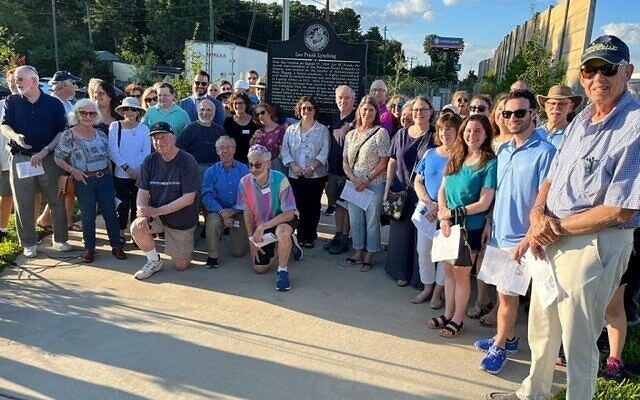
Among the dignitaries attending the Frank Memorial Service were Rabbis Steven Lebow, Rabbi Emeritus of Temple Kol Emeth; Daniel Dorsch, Congregation Etz Chaim; Alexandria Shuval-Weiner, Temple Beth Tikvah; Pamela Gottfried, Temple Kol Emeth; Jason Holz, Kehillat Chaim, Daniel Alter, Kol Emeth; Albert Slomovitz and Jonathon Adler, of Etz Chaim; and Cantor Blake Singer, Temple Kol Emeth.
Robert Wittenstein of the Anti-Defamation League stated that Frank’s murder was a “hate crime.” He also reminded the audience that just this past week the Atlanta Jewish Federation offices and The Breman Museum were evacuated due to a bomb threat and that antisemitism is alive and well all over the country. Wittenstein also stated that Leo Frank is the only known Jew in the U.S. to be lynched.
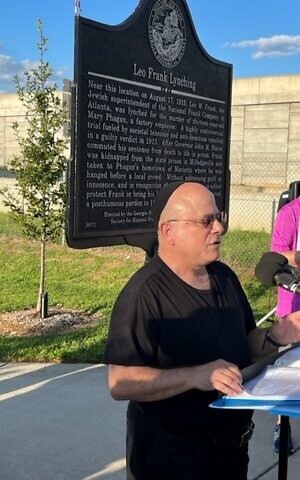
Additionally, more than 500 African American men were lynched in Georgia over a 90-year period.
Robert’s father, Charles Wittenstein, and Dale Schwartz, both attorneys for the ADL, drafted a pardon for Leo Frank in 1983. Unfortunately, this pardon was not approved by the Pardons and Parole Board. Ultimately, in 1986, with mounting pressure on the Pardons and Parole Board, a posthumous pardon was granted. It did not pardon Leo Frank for the murder, but it pardoned him because the state of Georgia failed to protect him while in their custody.
Chuck Marcus, a grand nephew of Frank’s wife, Lucille Selig, commented that he remembered his great-aunt clearly. She never hid the fact that she was Leo Frank’s widow. She never remarried and lived by herself on Peachtree Street until her death in 1959.
Philip Goldstein’s grandparents had a general merchandise store and shoe repair shop off Marietta Square around 1912. After Governor Slaton commuted Frank’s sentence to life in prison, an angry crowd began to form outside the Goldstein store. Fearful for what might happen, the Goldsteins rushed out of their store with their two children and a sister-in-law. They immediately got on a streetcar that would take them to Atlanta. The crowd began rocking the streetcar, but a gentleman outside got into the car and motioned the driver to leave.
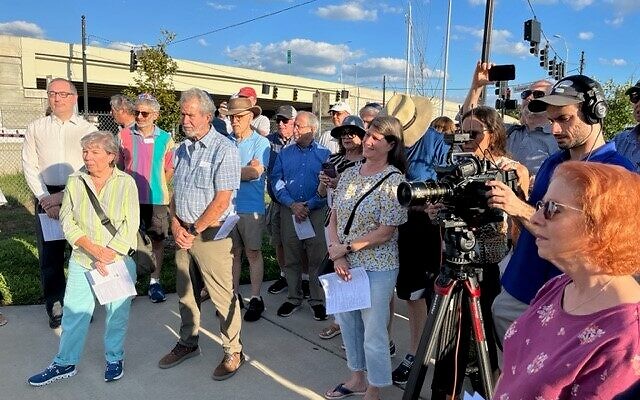
Rabbi Lebow stated, “It is possible that even if we can’t individually change the entire world, maybe we can take some broken part of the universe and make it whole again. Somehow, in some way, if we could clear the name of Leo Frank, an innocent man, then that small portion of the universe would finally be righted.”
This memorial event brought a diverse group together from different areas of Atlanta and Marietta. It also reminded participants that though we have problems in our state and nation, we are fortunate to live peacefully together. The program ended with the audience singing “God Bless America.”
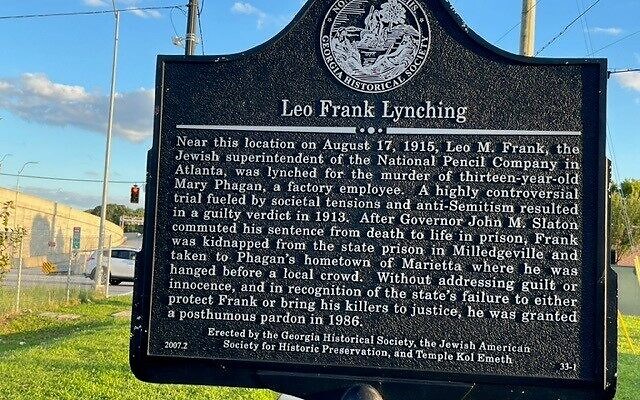
Leo Frank Lynching Memorial Plaque
Near this location on August 17, 1915, Leo M. Frank, the Jewish Superintendent of the National Pencil Company in Atlanta, was lynched for the murder of thirteen-year-old Mary Phagan, a factory employee. A highly controversial trial, fueled by societal tensions and anti-Semitism, resulted in a guilty verdict in 1913. After Governor John M. Slaton commuted his sentence from death to life in prison, Frank was kidnapped from the state prison in Milledgeville and taken to Phagan’s hometown of Marietta where he was hanged before a local crowd. Without addressing guilt or innocence, and in recognition of the state’s failure to either protect Frank or bring his killers to justice, he was granted a posthumous pardon in 1986.
- News
- Local
- Mike Weinroth
- Leo Frank
- Georgia Historical Society
- Jewish American Society for Historic Preservation
- Temple Kol Emeth
- Frey Gin Road
- Rabbi Steven Lebow
- Daniel Dorsch
- congregation etz chaim
- Alexandria Shuval-Weiner
- temple beth tikvah
- Pamela Gottfried
- Jason Holz
- Kehillat Chaim
- Daniel Alter
- Albert Slomovitz
- Jonathon Adler
- Blake Singer
- Robert Wittenstein
- Anti-Defamation League
- The Breman Museum
- Chuck Marcus



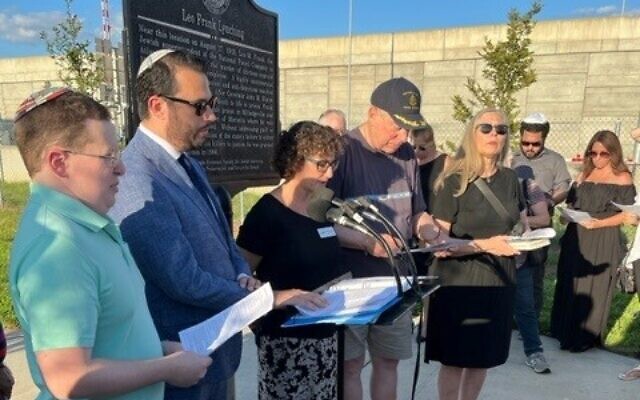
comments